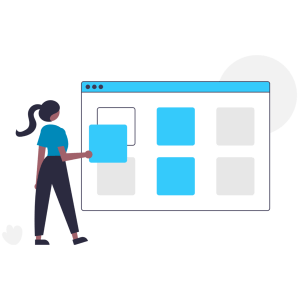E-Learning / LMS Platform Malaysia
An e-learning platform is an integrated and interactive set of online services that provide instructors, trainers, learners, and those involved in the training & learning with information, tools and resources. These platforms exist to support and enhance the delivery and management of eLearning content.
One type of eLearning platform is a Learning Management System(LMS), a software application for the administration, documentation, tracking, reporting, automation, and delivery of educational courses, training programs, or learning and development programs.
The purposes of LMS are to deliver and manage all types of content, including video, courses, and documents. LMS also provides learning experiences adapted to individual learners- this includes insights into user progress through built-in analytics to allow the instructors and learners to collaborate online.
Depending on the LMS you choose, the features may include a centralised user portal for administrators and course creators to log in securely and complete tasks, automated test scoring, and performance management systems based on user behaviours. An LMS might also include a built-in Experience API-compliant content management system for authoring content and adding elements and the technical and course development support- including built-in tutorials and lesson plans.
There are several types of LMS that organisations can choose from. Here are some comparisons to help you make your choice: –
- Free vs Commercial: ~
- Free LMS allows anyone who knows to deploy it and create a course that can be accessed via an eLearning environment. However, free LMS doesn’t have support, so you need to hire a specialist.
- Comparatively, Commercial LMS is designed to be used by any organisation, is easy to deploy and has 24/7 support.
- SaaS vs Licensed Product: ~
- The “Service as a Software”(SaaS) model is the most popular LMS because it is easy to deploy, is cloud-based and includes frequent free upgrades. Technical support is generally retained for the entire use period.
- Comparatively, a Licensed Product can offer the ultimate experience in customisation and customer support. This increases the product’s reliability for users, but the permission can be limited by time or included as a premium paid add-on.
- Built-in Authoring Tools: ~
- This benefits courseware developers who prefer having access to built-in authoring tools that enable complete course creation and revisions. This ability allows them to easily upload previously created courses and lessons from authoring tools or LCMS/CMS.
The general benefits of a Learning Management System (LMS) include the ability to learn-on-the-go, easy accessibility (via any mobile device to capture learning opportunities and achieve flexibility in learning pathways), access to a variety of learning materials, and the ability to access analytics which provides a progress report of every user to provide proof of knowledge.
Choosing a suitable LMS can be a daunting task, but we are here to help you. First of all, you need to consider the needs of your business by figuring out your learning objectives and course logistics; then, you must consider your audience and the type of content you would like to create by evaluating technical considerations and limitations. Lastly, set the feature priorities you may want to include: discussion boards or forums, test/assessment capabilities, enhanced security measures, grading/scoring capabilities to track progress, data tracking, and automated user functions (such as alerts).
What makes it a good LMS?: As everyone learns differently, a good LMS should adapt to the user. The system should have custom accessibility, flexible display settings, and multiple evidence methods to suit a wide range of courses and learning styles. Also, a good LMS should be used for training, learning and assessment together.




